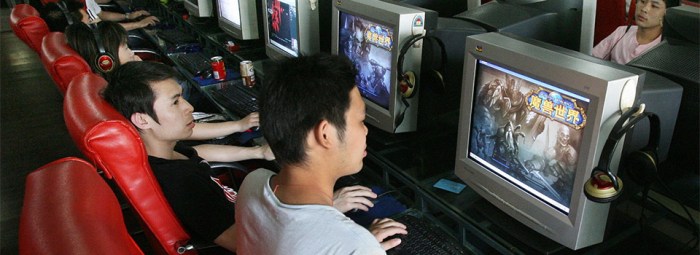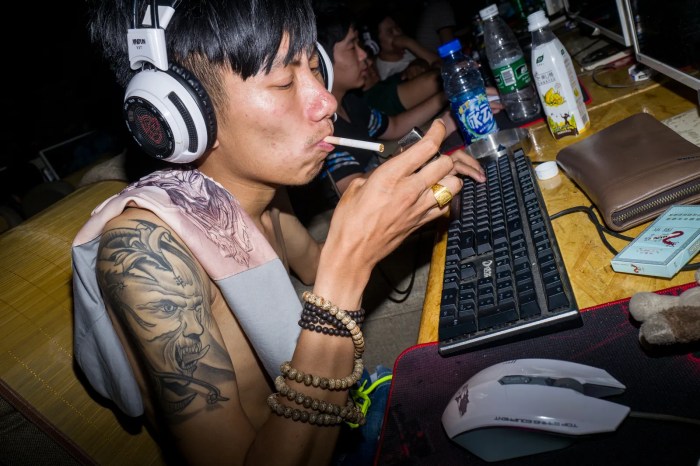Chinese gamer spends six years at internet cafe – the headline alone screams epic saga. Imagine: six years, lost in the digital world, a life unfolding within the glow of computer screens and the hum of keyboards. This isn’t just a gaming addiction; it’s a life lived entirely within the confines of a bustling internet cafe, a testament to the pull of virtual worlds and the complexities of modern life in China. We delve into the story of this individual, exploring the reasons behind his extraordinary choice, the impact on his health and relationships, and the broader context of gaming culture in China.
This story explores the individual’s daily routine, his gaming habits and preferences, the socioeconomic factors that contributed to his situation, the unique environment of a Chinese internet cafe, and the broader cultural implications. We’ll uncover the potential for both escape and community within this seemingly isolated existence, examining the complex interplay of addiction, social isolation, and the allure of the digital realm.
The Individual’s Story: Chinese Gamer Spends Six Years At Internet Cafe
Six years. A lifetime spent within the flickering glow of computer screens, the hum of keyboards a constant lullaby. This is the story of a Chinese gamer, their existence interwoven with the fabric of an internet cafe, a digital cocoon spun from ramen wrappers and discarded energy drink cans. This isn’t a tale of heroic exploits or grand achievements, but a quiet, poignant narrative of a life lived on the periphery, a testament to the seductive, yet ultimately destructive, allure of virtual worlds.
A Day in the Life of a Digital Hermit
The day begins, not with the rising sun, but with the blinking cursor on a darkened screen. He wakes, stiff and aching, on a threadbare mat he calls a bed, tucked away in a quiet corner of the internet cafe. The air is thick with the scent of stale cigarettes and instant noodles. He stretches, a groan escaping his lips, the result of countless hours hunched over his keyboard. Breakfast is a hastily consumed bowl of instant noodles, purchased from the cafe’s vending machine. The rest of the day is a blur of gaming, punctuated by brief trips to the restroom and the occasional refill of his energy drink. He communicates with others primarily through the game, his social interactions limited to typed messages and fleeting digital encounters. The rhythmic click-clack of the keyboard becomes the soundtrack to his existence, the vibrant colours of the game a stark contrast to the drab reality surrounding him. The late-night hours blur into a perpetual twilight, marked only by the shifting patterns of light on the screen.
Physical and Mental Health Consequences: A Slow Decline
The physical toll is evident. His skin is pale, his eyes bloodshot and perpetually tired. Carpal tunnel syndrome is a constant companion, a dull ache in his wrists a reminder of his sedentary lifestyle. Poor diet and lack of exercise have taken their toll, leaving him gaunt and weak. Beyond the physical, the mental health consequences are equally alarming. Social isolation breeds depression and anxiety. The lines between the virtual and real world blur, making it difficult to distinguish between reality and the escapism offered by the game. Sleep deprivation further exacerbates these issues, leading to a cycle of exhaustion and irritability. His mental state is a fragile ecosystem, teetering on the brink of collapse. This is not an uncommon story; many cases of severe health problems, both physical and mental, directly linked to prolonged periods spent gaming in internet cafes, have been reported across Asia.
Social Isolation: A World of Ones and Zeros
Social interaction is minimal, almost nonexistent outside the virtual world of his game. He rarely speaks to the other patrons, preferring the anonymity offered by the dimly lit corners of the internet cafe. His family? A distant memory, replaced by the camaraderie – however superficial – of online guilds. One day, a cafe worker accidentally knocks over his drink, spilling it onto his keyboard. Instead of a polite apology, he merely grunts, eyes glued to the screen, already absorbed in the game again. This small incident encapsulates his social interactions – brief, impersonal, and ultimately insignificant in the grand scheme of his existence. His relationships have withered, choked by the suffocating grip of his addiction. The digital world has become his sole reality, a comforting yet isolating refuge from the complexities of human connection.
Socioeconomic Factors
Six years spent in an internet cafe paints a stark picture of socioeconomic hardship. This isn’t a story of simple laziness; it’s a narrative woven from threads of poverty, limited opportunity, and perhaps, a desperate clinging to a semblance of normalcy in a chaotic life. Understanding this individual’s situation requires examining the complex interplay of financial constraints and societal pressures.
The most likely contributing factor is extreme poverty. The cost of living, especially in rapidly developing Chinese cities, can be incredibly high. Rent, even for a small apartment, can consume a significant portion of a low-income individual’s earnings. Food, transportation, and healthcare further strain already tight budgets. For someone struggling to meet these basic needs, the allure of a cheap, 24/7 refuge like an internet cafe, even if only for basic necessities, becomes understandable.
Housing Affordability and Access
Affordable housing is a significant challenge in many Chinese cities. The gap between wages and housing costs continues to widen, pushing many lower-income individuals into precarious living situations. The internet cafe, offering a roof over one’s head (albeit a shared one), albeit minimal comfort, represents a tragically pragmatic solution to a crippling lack of affordable housing options. This is particularly true for individuals without strong family support networks or access to social safety nets. Imagine the daily struggle: the constant awareness of impending rent, the fear of eviction, the gnawing anxiety of not having a secure place to call home. This is the reality for many, and the internet cafe provides a temporary escape from that crushing pressure, even if it’s a temporary and unhealthy one.
Fictional Family Background and Relationship Dynamics, Chinese gamer spends six years at internet cafe
Let’s consider a fictional background for our protagonist: Zhang Wei, a young man from a rural village in Henan province. His family, consisting of his aging parents and a younger sister, relies heavily on agricultural income, which is often unreliable due to unpredictable weather patterns. Zhang Wei’s parents were unable to afford his education beyond middle school, pushing him to migrate to the city in search of work. He faced numerous setbacks – low-paying jobs, exploitation by employers, and the constant struggle to send money back home. The strain on his relationship with his family is immense; he feels immense guilt for not being able to provide more, while they, in turn, worry about his well-being and safety in the city. His situation isn’t one of choosing the internet cafe over family; it’s a desperate attempt to survive, a situation where the internet cafe becomes a temporary haven from the overwhelming pressures of his circumstances. He maintains infrequent contact, sending small sums of money whenever possible, clinging to the hope of one day providing a better life for himself and his family. The weight of responsibility and the constant struggle for survival have eroded his ability to maintain close family ties. His situation highlights the deep-seated economic inequalities that drive many to make difficult choices.
The tale of the Chinese gamer who spent six years in an internet cafe isn’t just a story of addiction; it’s a reflection of societal pressures, economic realities, and the powerful allure of virtual worlds. It highlights the importance of community support, accessible mental health resources, and a deeper understanding of the complexities of gaming culture in China and beyond. His story serves as a poignant reminder of the hidden lives lived within the digital age, urging us to consider the human cost behind the headlines and the screens.
 Invest Tekno Berita Teknologi Terbaru
Invest Tekno Berita Teknologi Terbaru

